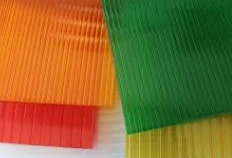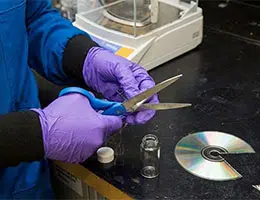 Polycarbonate is a thermoplastic material that has multiple uses. Like all thermoplastics , it is malleable through the action of heat .
Polycarbonate is a thermoplastic material that has multiple uses. Like all thermoplastics , it is malleable through the action of heat .
It is a polymer with molecules attached to carbonate groups . It usually comes in sheets made up of multiple layers.
Thanks to its transparency and its resistance to high temperatures and impacts, polycarbonate can fulfill different functions. In many contexts it serves as a replacement for glass .
Domes and roofs can be built with polycarbonate, to mention two possibilities. Depending on the configuration of its sheets, it can allow more or less light to pass through its surface. A thick, dark-colored polycarbonate will block almost all light , while a thin, transparent polycarbonate will be passed through by about 80% of the sun's rays.
Other frequent uses are linked to the enclosure and division of environments . With polycarbonate panels you can create and divide rooms or rooms.
Polycarbonate is also used to make bottles and glasses . These containers are reusable: they can be washed and used many times. In any case, extended use can cause, over time , cracks or scratches to appear in the polycarbonate, in which bacteria may lodge. That is why cleaning must be carried out carefully.
Toys; parts of computers , cameras and vehicles; CDs; DVDs; traffic signs; and advertising posters are products that are also manufactured with polycarbonate, whose recycling process is quite complex and expensive.
 At the end of 2016, IBM presented an innovative method to recycle polycarbonate, which has several advantages over those used until now. Since these plastics are used in countless products, both for everyday and industrial use, their volume on our planet is truly considerable and for this reason it is important to decide what to do with them when we must throw them away. In this framework, the company pointed out that each year the global production of these plastics approaches 3 million tons.
At the end of 2016, IBM presented an innovative method to recycle polycarbonate, which has several advantages over those used until now. Since these plastics are used in countless products, both for everyday and industrial use, their volume on our planet is truly considerable and for this reason it is important to decide what to do with them when we must throw them away. In this framework, the company pointed out that each year the global production of these plastics approaches 3 million tons.
The method developed by IBM to recycle polycarbonate has positive results for both the environment and people's health. In short, we can say that it is a very short process, a single step, that prevents the material from decomposing and the bisphenol A from going through leaching: when the soluble matter is extracted from a mixture by means of a solvent liquid.
IBM achieved a process that transforms recycled polycarbonate into plastic that can be used safely in applications as delicate as water purification, the manufacture of medical instruments and even fiber optics. Moving on to more technical terms, scientists discovered that by adding a fluoride-based reagent and a certain amount of heat to old products , a plastic can be generated whose properties surpass the original . Given that the biggest threat present in previous recycling methods was leaching, the fact that it no longer occurs represents a colossal achievement.
We know that one of the most harmful actions for the environment and the rest of the species is throwing waste into the sea. Unfortunately, every time we consume a product made with non-biodegradable materials we contribute to this problem to a greater or lesser extent. For this reason, the possibility of safely recycling polycarbonate was such important news for the health of the planet in general: instead of throwing away a CD or a plastic container, we can transform it into a new product without risks or loss of quality. .
